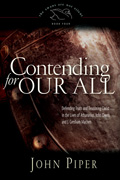
John Piper
Reviewed by: D. G. Hart
Contending for Our All: Defending Truth and Treasuring Christ in the Lives of Athanasius, John Owen, and J. Gresham Machen, by John Piper. Published by Crossway Books, 2006. Hardback, 186 pages, list price $17.99. Reviewed by OP elder D. G. Hart.
Is controversy unbecoming to the church? Orthodox Presbyterians who know some of the history surrounding the founding of their denomination generally agree that controversy, though undesirable, is not wholly objectionable. J. Gresham Machen himself, who was a reluctant controversialist, recognized that without disputes and disagreements the church would have suffered immeasurably down through its history. "Men tell us that … we can preach the truth without attacking error," he wrote, but that would mean deserting the Bible, because "the New Testament is a polemic book almost from beginning to end."
Since the end of World War II, however, the dominant trend among evangelical Protestants has been to avoid controversy in hopes of finding a kinder and gentler version of conservative Protestantism. Within the last decade, a new generation of church leaders has sought a less militant means of professing Christ and ministering his word. Presbyterians have not been immune to these developments. "Doctrine divides, ministry unites," the peace cry of doctrinal indifferentists in the 1920s, is a perennial temptation for the church.
John Piper's new book, Contending for Our All, doughtily resists these recent trends. Through biographical sketches of Athanasius, John Owen, and J. Gresham Machen, the Minneapolis pastor confirms Machen's point about the necessity of controversy for the health and growth of the church and for the cause of orthodoxy. Piper covers Athanasius's contribution to the debates over Arianism and the victory of Trinitarian orthodoxy at the Council of Nicaea. Owen emerges as the leading defender of Puritan theology through the rough and tumble of seventeenth-century English Protestantism. And in Piper's hands Machen becomes an exemplary figure in the early twentieth-century struggle against theological modernism.
Piper does not explain his decision to select Athanasius, Owen, and Machen as representative figures. At times the book seems to lose the point about contending for the faith with warnings and advice about other aspects of Christian devotion. But on the whole the book effectively demonstrates that contending for the truth of the gospel will involve controversy and will yield positive benefits. Considering how widespread among conservative Protestants is the notion that contending militantly for the faith is a vice, to have an evangelical figure of Piper's prominence counter this outlook is a genuine plus. Especially for communions like the OPC, where the reputation for militancy has become predictable, Contending for Our All will be a surprising and welcome reminder of the necessity for the church to be ever diligent in fighting the good fight.
March 30, 2025
On the Trail with a Missionary
March 23, 2025
Midnight Mercies: Walking with God Through Depression in Motherhood
March 16, 2025
March 09, 2025
Zwingli the Pastor: A Life in Conflict
March 02, 2025
February 23, 2025
African Heroes: Discovering Our Christian Heritage
February 16, 2025
© 2025 The Orthodox Presbyterian Church